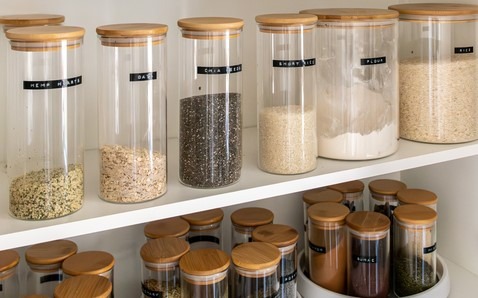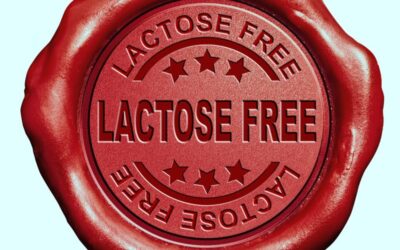If you’re living with irritable bowel syndrome (IBS), you’ve likely discovered the benefits of the low FODMAP diet. By limiting your intake of certain types of carbohydrates, you can significantly reduce symptoms like bloating, gas and abdominal pain. A well-stocked storecupboard can make meal planning and cooking much easier, even when you’re following dietary restrictions. So, to make your low FODMAP journey easier, stock up on these storecupboard essentials for IBS.
IBS and the low FODMAP diet
Before we dive into the essentials though, let’s briefly explore IBS and recap the role of FODMAPs. IBS can be annoying, inconvenient and debilitating. It affects 15-20% of people in the UK. So, you’re not alone. However, if your symptoms are new or if you have blood in your stools it’s best to get this checked out with your GP to eliminate anything more concerning. If you have a diagnosis of IBS, then you’ll be advised to follow a low FODMAP diet. This approach improves symptoms in over 75% of sufferers. FODMAP stands for Fermentable, Oligosaccharides, Disaccharides, Monosaccharides and Polyols. Put simply, these are short-chain carbohydrates that are poorly absorbed in the large intestine, leading to IBS symptoms in some people. The trigger foods are different for each person, so it’s always best to do this diet with the expert advice of an IBS dietitian. Otherwise, you could be on a restricted diet for too long, which could result in nutritional deficiencies.
Storecupboard essentials
Here are some essential ingredients to keep in your storecupboard to support your low FODMAP lifestyle:
Gluten-Free Grains:
- Oats: This is low in FODMAPs, so porridge would be a great start to the day and oat biscuits are a great snack
- Rice: White and brown rice are both low in FODMAPs
- Corn: Cornmeal, cornflour and polenta are all suitable for a low FODMAP diet
- Quinoa: This gluten-free grain is a great source of protein and fibre
- Buckwheat: Buckwheat flour and groats are low in FODMAP
Legumes:
These are moderately high in FODMAPs, but can be used in small amounts
- Chickpeas: Canned chickpeas, rinsed and drained, can be used in small portions
- Lentils: Red lentils are generally well-tolerated, but it’s important to limit portion sizes
- Peas: These are versatile and tolerated in small amounts
Nuts and Seeds:
- Almonds, walnuts and hazelnuts: These versatile nuts can be enjoyed in moderation
- Pumpkin seeds: A great source of magnesium and zinc
- Sunflower seeds: Great to add crunch to cakes and salads
Dairy and Alternatives:
- Lactose free milk: This is a great alternative and an easy part of a low FODMAP diet
- Dairy free milk: Almond milk is a suitable low FODMAP alternative
- Yoghurt: Look for lactose free yoghurts and those made from soy or coconut milk
Sauces and Condiments:
- Soy sauce: Tamari or soy sauce are low FODMAP options
- Vinegar: Balsamic, red and white wine vinegars are all low in FODMAPs
- Mustard: Most are fine, including Dijon mustard, but avoid those that include honey
- Maple/Golden Syrup: A small amount of syrup can add sweetness, but still be low in FODMAPs
Other essentials:
- Herbs and spices: Most herbs and spices are low in FODMAPs, adding flavour without IBS symptoms
- Olive oil: A healthy cooking oil that’s low in FODMAPs
- Garlic infused oil: This can add flavour to your dishes
- Dried fruits: Small amounts of raisins, currants and cranberries are low in FODMAP
Tips for low FODMAP storecupboard shopping:
- Read labels carefully: Check ingredient lists for hidden FODMAPs like garlic, onion, wheat, sweeteners and honey
- Start slowly: Introduce new foods gradually to monitor your body’s response
- Check out online options: FODMarket and Bay’s Kitchen have a range of useful storecupboard essentials for IBS
- Consult a Dietitian: An IBS dietitian can provide expert, personalized advice and help you create a low FODMAP meal plan and ease your FODMAP journey
By stocking your storecupboard with these low FODMAP essentials, you can enjoy delicious and nutritious meals without compromising your digestive health or compromising on flavour.
Can a dietitian help with IBS relief?
If you need expert advice and support to manage your IBS symptoms, then I can help. I’m an IBS Dietitian trained in FODMAPs can use my knowledge and experience to advise you with the low FODMAP diet. It can be difficult to do alone, but with my support, I can help you identify their triggers and improve management of your IBS symptoms. As a FODMAP dietitian, I’ll provide practical ways to help you fit the low FODMAP diet into your lifestyle. Ensuring that you still get all the nutrients you need from your food. I can be your ‘IBS Dietitian near me’, although I’m based in Cardiff, I practise across the UK via virtual sessions. I offer a free initial telephone consultation, so why not arrange a call today.
Disclaimer: This blog is for information purposes only and does not substitute for professional medical advice. Please consult your healthcare provider for personalised diagnosis and treatment of IBS.




